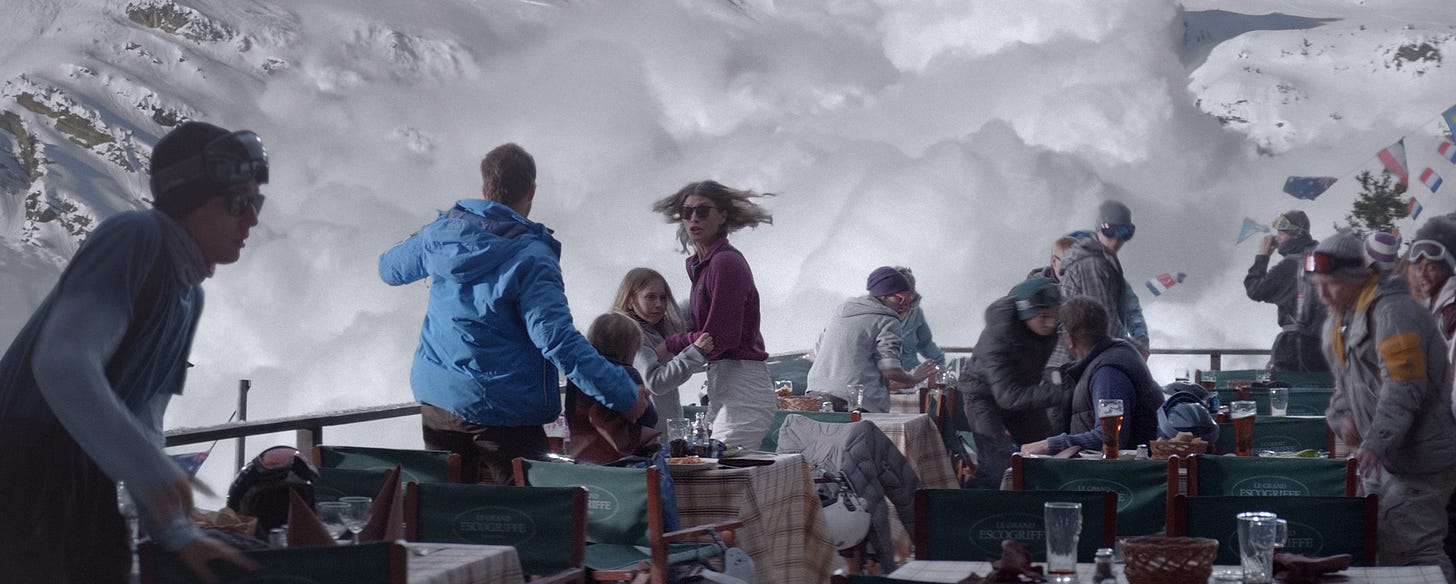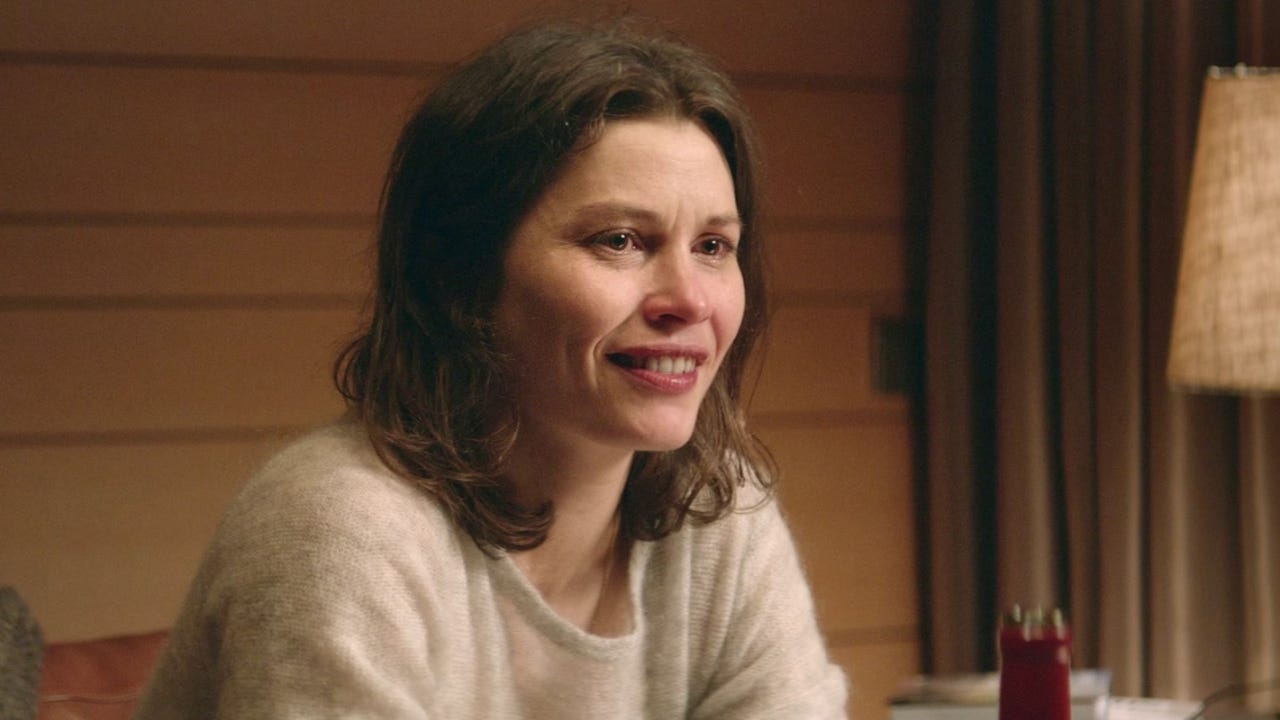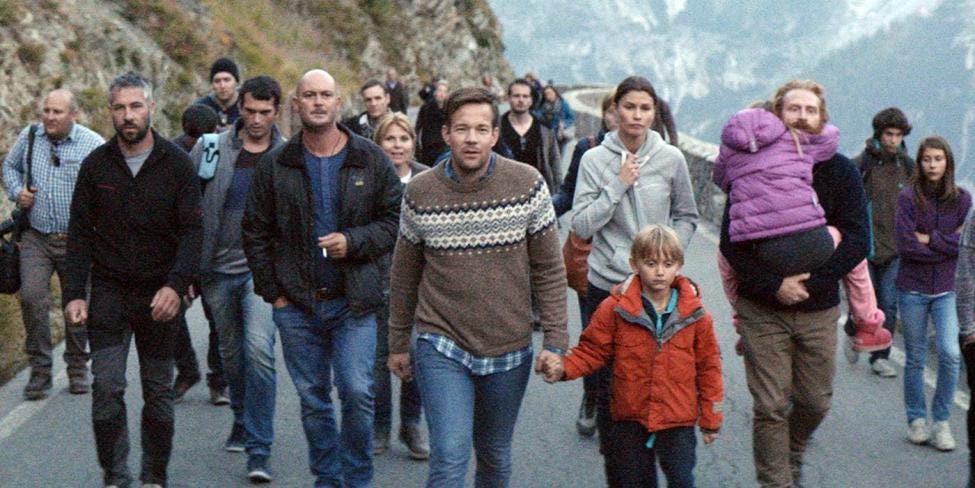Force Majeure
Directed By: Ruben Östlund
Force Majeure is the breakout 2014 Swedish film from Ruben Östlund and is streaming on Max right now. It stars Johannes Kuhnke as Tomas and Lisa Loven Kongsli as Ebba, with a fun appearance from Kristofer Hivju of Game of Thrones fame playing Mats. It was enough of a hit that is garnered an American remake, which I refuse to ever watch on principal alone.
I’ve avoided this film for far too long. Now, wanting to catch up with Östlund as a director, I had the perfect reason to correct this omission. Having known the story around the film’s inciting incident I falsely assumed it was a one-trick pony with nothing else to offer. I was wrong.
The film follows a well off Swedish family on vacation at a French resort in the Alps. Early in the trip they have an encounter with an avalanche that leaves the family shaken. They then have to grapple with the fallout from that event.
At this point I really don’t feel like skirting around the details of the film and would suggest you come back after watching, if you don’t want anything spoiled.
During this avalanche the Tomas is trying to calm his family as they watch it approach. “It’s under control”, “they know what they are doing”. He’s steadfast in this belief until the very last moment when the white snow crests over the overlook and he turns and runs, abandoning his wife and children to their fate. Tomas was correct and as the white snowy mist fades and he returns to his family ignoring the truth of his betrayal.
Ebba is clearly shaken by what has happened and is struggling. This manifests in small ways at first, her walking ahead of the family, distancing herself from Tomas. Then, that night at dinner with an acquaintance she confronts Tomas and bluntly declares that he abandoned the family and ran like a coward. Tomas denies everything and states that their reality of the event is different.
The filmmaking is static and still, with the camera often placed at a distance, holding steady and observing. It’s almost neutral in a sense, not over sensationalizing. Perhaps this distance is an indication of our ignorance of the internal life of those around us and all we can react to is what we see. It’s highlighted by the more reserved Swedish temperament, where feelings and emotions are played out in grimaces and small facial cues rather than grand demonstrations and bravado.
This slower static camera work can sometimes feel disorienting, us so accustomed to the quick cuts and closeups so prevalent in modern filmmaking. There is something more considered in Östlund’s approach that I often find in European and older filmmaking that, once accustomed to, proves emotionally effective.
The close family we saw is beginning to fracture. The children are left alone, occupied by devices and huddled together in bedrooms. Ebba spends the next days alone on the mountain confronting her thoughts.
Tomas’s friend Mats joins them and Ebba, again, confronts the issue in a public space, this time drunk, continuing to fall apart. Tomas denies his cowardice a second time and his friend attempt to concoct a biological and psychological reasoning for Tomas’s actions. Fight or flight, we cannot control our reactions, ect. When Ebba demands Tomas show a video he took on his phone during the avalanche, he cannot run anymore, and they all know. She is most traumatized by the idea that his instinct is away from his family. Can he control that, is it really him? What would anyone do when confronted by imminent death?
Mats and his girlfriend escape the awkward dinner only to run into their own issue. Fanny questions whether Mats would be dependable or the type of man to run, like Tomas. The idea of family and gender roles continue to be interrogated with Fanny connecting Mats’ divorce and abandonment of family for his own desires with Tomas running from the Avalanche.
Ebba has a conversation with her friend, from the first dinner, who is now on her second man. She is married but lives in an open relationship, pursuing her own desires, yet still with a husband. Ebba questions her philosophy and is certain that there must be more, that loving and meaningful long-term relationships must matter. Does Ruben Östlund believe in marriage and the family unit or not? Or is he pointing out the frailties and contradictions and personal sacrifices that are required within a family?
Somehow the family manages to go skiing together again. They rise to the top of the mountain and are subsumed by a thick cloud. They stay close and make their way down the mountain, Tomas reassuring, once more, that everything will be fine. He stops with the children, but Ebba is gone. He hears her screams and immediately runs up the mountain to “save” her and returns to the children with her in his arms. This “brave” act was clearly staged by Ebba. She had made a choice that the family needed this and both adults seem to accept this duplicity as it allows them to resume life together.
The trip is over and they take a bus down the mountain road. But the driver is clearly incompetent and is nearly crashing off the edge at every switchback. Ebba is distraught and demands to exit the bus. It stops and she quickly leaves. All the other passengers are excited and start to storm off before being stopped by Mats, who proves Fanny wrong, and demands an orderly exit of the bus. Everyone watches the bus leave except for Ebba’s polyamorous friend who has decided to stay. Is she not afraid? Does she have nothing at risk? Why is it her who remains?
Ebba asks Mats to hold her daughter who is too tired to walk and the departed passengers begin to trudge down the mountain road. She clearly still does not trust Tomas, choosing instead for Mats to carry their child. The films ends here, questions still ringing in my head. What does it mean? How does the filmmaker feel? Are we all individualistic and the ties to family and marriage so thin that they disintegrates at the first sign of danger?
Films like this are successful not for their ideas themselves, but the fact that they have ideas at all. How these thoughts are conveyed through story and cinematography prove interesting artistic endeavors. How these cues are then read and interpreted by the viewer are worthwhile and part of the rhythm of it all. Too often our own agreement or personal determination of merit of a directors idea become the sole thing. Yet, engaging with an idea, even when you disagree, is profoundly more interesting than the shallow dismissal too often applied.
I would strongly recommend that everyone seek to analyze a piece of art (novels, films, music) by yourself prior to reading others ideas. Relying on your own interpretation and just trying to work it out provides a more engaging experience and opens yourself up to seeing things in different lights.
I’m still puzzled by the final sequence of the film and that is ok. Force Majeure seeks more than what appears on the surface and is worth engaging with.
“Force majeure is a clause that is included in contracts to remove liability for unforeseeable and unavoidable catastrophes that interrupt the expected course of events and prevent participants from fulfilling obligations. These clauses generally cover both natural disasters and catastrophes created by humans.”
Musical Pairing: Normandie, Shout of Louds







Great write up. I watched this movie the wrong way around. I watched the Will Ferrell "comedic" adaptation first Downhill I think it was called... then watching Force Majeure sometime later. Glutton I guess? But I love nuanced movies like this one... you know, movies that keeps you off balance the entire movie. They force you to watch the actor's nuanced performances for every eye roll, twitch, and glance to see if you can understand what is actually happening here. Particularly Lisa Kongsli's acting especially... which I think she crushes. (Definitely prefer her in this role to Julia Dreyfus in the same role. But maybe that's just me.)
I think you are 100% correct about the ending (not that my opinion is really all that validating save for the fact that one other human saw it the way you saw it?) and that your interpretation about how it all went down makes sense to me. But the thing that I found most interesting was how humans tend to build facts, and truths out of complete fantasies out of necessity. Tomas obviously ran. And yet, he had to believe, like in his soul, that he did not. Even faced with contra evidence to his own beliefs, he, I don't know, can't really even cope with it. "I agree that it looks like I'm running." I mean, come on. He HAS to have not run. He's dying out on this limb, while actively cutting it off simultaneously.
Another thing I found just amazingly realistic, and poignant is how everyone in this film beats the wife down... "see... you have to understand that it's the will to survive" you need to see it from a wider, more forgiving perspective. Society is telling her to let him off the hook, cut him slack (Reminds me a bit of the movie The Lobster and how society tells singles that they are required to get married). Also, Tomas tells his wife that "It doesn't matter how I perceived it, but you obviously thought it really dramatic... " (Read, 'I wasn't afraid'....... BUT YOU OBVIOUSLY WERE.) Which is BS in the extreme. But aligns with his utter petrification of being found out as a failure.
If a gunman appeared with me in a McDonald's or whatever - I believe I would run at them. This is a concrete fact in my soul. The odds of my running at a gunman though? I put it at an even 3%. On a good day. But I need to believe that I am that guy that will run towards and not away. But I'm probably not. And it actually causes me psychic pain to even say that outloud right here. I cannot be the coward. The failure. I have to be seen as the hero. With my family especially! And yet. Over the course of any given day? I screw up like Tomas did here a thousand different ways.
Anyway, I love films like this. Movies that are filled with nuance and that balance on the knife's edge of possible meaning. If you loved this film, a few others that sort of play in this space?? Maybe Personal Shopper, Killing of a Sacred Deer, Clouds of Sils Maria, On Body and Soul, and maybe Columbus?? Anyway - great write up. Keep it up. Personal favorite quote of the piece, "Yet, engaging with an idea, even when you disagree, is profoundly more interesting than the shallow dismissal too often applied." Couldn't agree more. Taylor
I loved this film and have only seen the original. Think I will skip the remake!